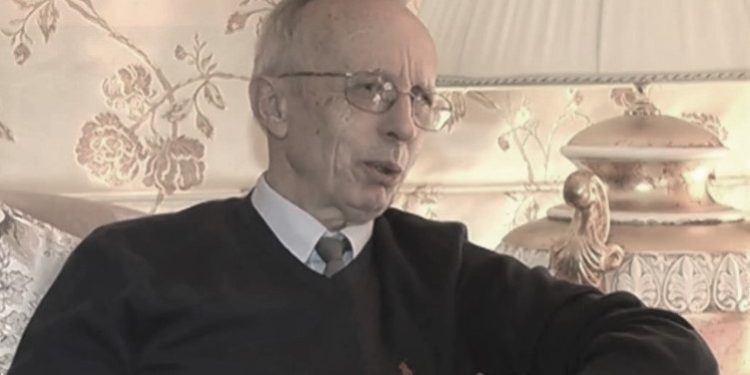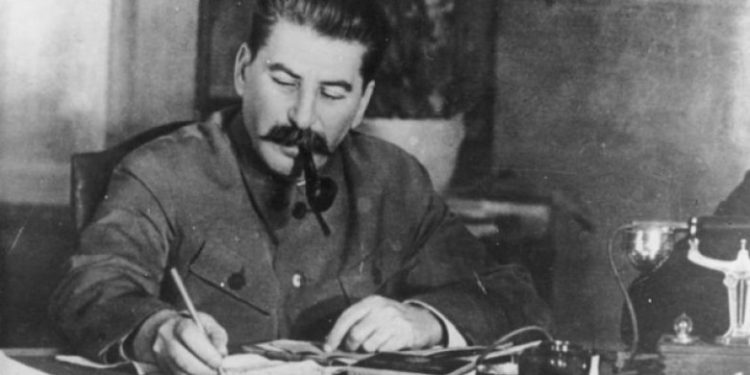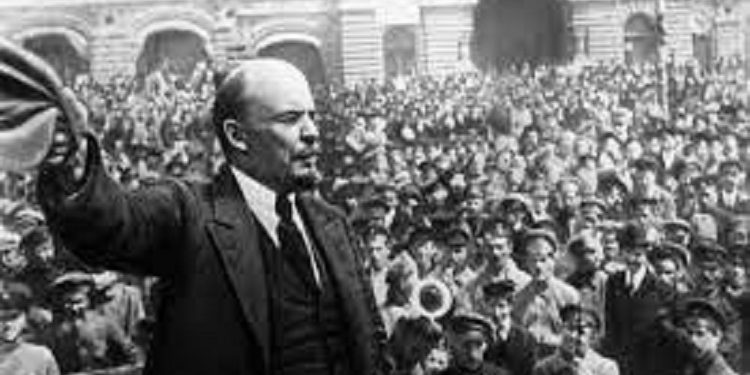Alberto Frasher
Memorie.al/In our time the understanding of the world is not possible without the full awareness of the absolute Evil of the twentieth century. Western nations, the world of culture in primis, in the immediate post-war period tried to understand and condemn the ideology of Nazi-fascism with particular determination. They were aware of the dangers that their ideology could have created to the future of democracy. Works of art and literature and in-depth studies were supported by the society without neglecting the historical truth. All the forces of the world of culture, not only of the right, but also of the left, were engaged in this great enterprise.
The fall of the Berlin Wall, on November 9, 1989, marked the unseemly collapse of a system that had robbed European civilization of half of its nations and that was rooted in communist ideology, following the lifeless shadow of Stalin with its eyes closed. A substantial part of the world of culture and, often, even the political class of Western countries have been largely infected by the ideas of the left. From a substantial point of view they have blithely glossed over the Absolute Evil of leftist totalitarianisms. The world of culture? It is easier to publish a romance novel than a literary work recounting human suffering in countries where leftist totalitarianism reigned.
Almost thirty-two years after the fall of the Berlin Wall, the Western world is unable to extricate itself from a crisis that we can hardly consider of an exclusively economic nature. Far beyond economic difficulties, we have the impression of an existential crisis linked to values and our model of life. A model of society, substantially corroded by the times. Truths that until yesterday we believed to be solid, today we see crumbling and then set.
There has been a giant experiment, absurd and violent, that believed to solve the problems of society by dividing into equal portions the poverty of citizens. All equal before the law. The rhetoric of this false principle can only produce misery. The prophecy of the Swiss Henri-Frédéric Amiel (1821-1881), almost a century and a half ago, is shocking:
“The masses will always be below average. The age of majority will be lowered, the sex barrier will fall, and democracy will reach the point of absurdity by leaving the decision about the greatest things to the most incapable. It will be the punishment of its abstract principle of so-called Equality, which exempts the ignorant from educating themselves, the imbecile from judging themselves, the child from being a man and the criminal from correcting himself.
The public law founded on equality will fall apart because of its consequences. Because it does not recognize inequality of value, of merit, of experience, that is, individual effort: it will culminate in the triumph of scum and flattening. The worship of appearances is paid for.”
Life, the Universe and its evolution consist in the spontaneity of differences, which in turn, generate movement, development, conflict and even peace. Since the early 1920s it was seen that the success of the Soviet experiment would be unlikely. At that time, discontent was inevitable, after which came violence, unleashed as never before, against the citizen and his creativity. Man went from being a citizen back to being a subject. Creativity ended up looking like propaganda, the stepsister of an ideology that had created only illusions.
We cannot move towards the future without a historical and cultural reference. It would be like walking on water. Knowledge and true understanding of the past are indispensable to make citizens aware of their path towards the future. In the last two decades the evolution of the democratic order towards perfection has been attenuated in favor of nostalgia for the past. The crisis of the great uncertainties of our time pushes many European citizens to relive a kind of nostalgia for the past. Of that past of totalitarian regimes, right-wing or left-wing, which suffocated all freedom in the tunnel of poverty, deception and submission. On the nations of the old continent a holocaust of almost five years had been unleashed in the course of a great war. There was also another holocaust, fierce and interminable, from 1917 until the fall of the wall. That wall that saw Germany divided in two, a nation that, like Italy, England and France, made extraordinary contributions to world culture and science.
Having known, through direct personal experience, the totalitarianism of the left in its relationship with the daily life of the citizen, I was struck for many reasons. One of the most complex aspects, I think, is the relationship of power with the world of research and, in particular, with the universe of art. The free thought of the citizen forms and evolves spontaneously in the space between society and the propaganda of power and, in this evolution, the function of art is fundamental. It also happens in our democratic societies. Everyone, as soon as in power, invents theories that tend to transform art and the mass media into allies of ideology and propaganda. It is precisely in this critical area that the longevity of totalitarianism is played out. The relationship between power and the creativity of the citizen inevitably becomes conflictual. The artist and all forms of human creativity become the ultimate victims of totalitarian regimes.
The left in Western countries was not happy to witness the shameful collapse of communism in the second half of the continent, because it knew it would have to pay the consequences. The collapse, spontaneous but consistent with the logic of history, was a true and shameful implosion, without dignity and, certainly, written in the DNA of their ideology.
After the fall of Nazi-Fascism, the arts have endlessly revisited the reality and suffering of the first half of the 20th century caused by totalitarianism and World War II. In the case of Eastern totalitarianisms, however, there is a relative silence that I would call serious. Nostalgia for totalitarianism will not save the world. And, I would add, it cannot be the propaganda of the parties to deepen the knowledge of the truths about the Absolute Evil of the twentieth century. Only art, in all its forms, will be able to convey to the young citizens of the world the historical truth together with the tragedy of human suffering in the whole of Europe.
Ideology and power tend to dominate art and turn it into a propaganda tool, which is not always possible due to the relative innate independence of the artist. I think that it is art and every form of research that defines that human trait that has always characterized the best of our existence.
The Universe and Nature, the mystery of Beauty and the light of wisdom, Peace as an expression of Balance and Harmony, Freedom and Creativity of Man have no nationality. The artists and the great citizens of the World know it well. They see in creativity the fascination of Nature and, in a certain sense, the immortality of mankind … and, for this noble conviction of theirs, they are the first to suffer the violence of Evil.
The true knowledge and awareness of Evil, I believe, have a non-negligible limit that largely depends on the sensitivities and personal experiences of those who have grown up, culturally speaking, in a democratic society. This limit, in a certain sense, is inversely proportional to the evil and violence of the events that had as victims millions of human beings, children, women, elderly and unarmed citizens.
Not only the violence, but there is also the absurdity of Evil to make the events very incredible. Two brothers, in a country of Eastern Europe, during the war one was sided with the nationalists and the other with the communists. After the war they both worked in the same city. The nationalist boasted of having had a partisan brother and went on with his career; the communist partisan, on the other hand, had always been in the regime’s sights because he was the brother of a nationalist. How can one believe such nonsense?
It is necessary to understand that every form of extremism is a deformation of balance and harmony in the life and reflections of Man. Evil takes refuge in the folds of every extremism to germinate as soon as conditions make it possible.
Writing about these events is difficult, if not impossible. Painting the authentic picture of lives altered by the plague of totalitarianism should be a requirement of the whole society. From the numerous contacts with old friends, since the first years after the fall of the wall, I understood that people lived in a sort of nightmare not of the past, formally now closed, but of the future. Little thought was given to the past and its infinite evil.
In 2010 I went to Albania to visit the sanctuary of St. Anthony, forty kilometers north of Tirana. A sixteenth-century shrine that was razed to the ground by Hoxha’s communist regime in 1967. As a child, my parents, Maria Venturi and Francesco P. Fràsher, and I would go to the shrine of St. Anthony once a year and sleep outdoors with thousands of other believers. A forest of young oaks was our nightly refuge. We were fond of these customs. They were part of our curiosities and our way of being. Revisiting the shrine, rebuilt from nothing, I had a long talk with Brother Fran Pёrlala about the tragedies of the past. Brother Fran told me: we need to think long and hard to understand why these tragedies happened.
Understanding the why of a human tragedy . . . One word!
History will hardly be able to provide an exhaustive answer to the problem. I believe so, because the nature of Evil must be sought in the meanders of our complex existence, individual and collective, and it expresses itself in a thousand unpredictable forms.
An immense system of data, political, economic and other analyses is limited to build the theory, so to speak, of totalitarianism. This truth, or presumed to be so, is simply formal and cold, from history books. The fact, to give an example, that the war had millions of victims, takes refuge in a corner of the history books without engaging human sensibility. Even though it is absolutely necessary, history remains history because it prescinds from human pain. Only art, unaware of formal theories, enters the life of the individual, tells the monstrosity of Evil and the suffering of Man.
The immense creative work of Man, in every age, has had as a thread the cultural tradition of his own nation, even when the grip of deviated forms of power has tried to transform the creative vein of their children in a propaganda tool.
If we are to understand history, we must start with the individual, recounting his joy and suffering. With the story that focuses attention on Man, we could weave the immense web of history. It would be, instead, impossible to understand the reality of Man by looking from the heights of formal history. It would not be possible to understand the evolution of Man and his thought without the work of Homer, Dante, Shakespeare, Goethe or Dostoievsky. Art, in its long historical journey, through painting, music and literature, has immortalized the faithful image of human evolution. Today we know how to distinguish the Man of the ancient Mediterranean from that of the Vikings, the Man of ancient Rome from that of the Middle Ages. To make possible such sensitivity and knowledge have been the works of art, which in all ages have focused in Man the object of their patient research.
The survivors of the holocaust of five years of war and the witnesses of the endless violence with millions of deaths and deportations of almost a century marked by leftist totalitarianism, are no more. Future generations will understand the human pain and the deeper meanings of that tragedy, yes from history books, but especially from works of art. Those of the right had unleashed a war that in five years made 50 million innocent victims: Jews and Roma, Russians and Poles, Germans and Italians, British and Americans. Different was the suffering of the nations of the East, subjugated by a ruthless and extremely dangerous form of totalitarianism for half a century: deprivation of freedom and the right to property, concentration camps and forced labor, a suffocating egalitarianism that erased the natural right of merit. Even children deported along with their parents. My friend, Eugjen Merlika, son of an Albanian engineer and an Italian professor of philosophy, was deported together with his parents to a forced labor camp. The year was 1945. My friend was only two years old. He only came out of that communist hell in the spring of 1991. For the first time he saw the light as a free man at the age of 49. Is it possible to leave the truth of such suffering in the notebooks of history as if it were something that concerns primitive Man? All of this was the Absolute Evil that our fellow human beings suffered from 1917 until the collapse of the Berlin Wall.
Those who, in the countries of Eastern Europe, have experienced difficult realities far beyond the dimension tolerable by man, arrive at a state of continuous reflection. Initially, just after liberation, one experiences an irrepressible and invasive joy, almost frightening. This would be the trauma of liberation. A trauma that then becomes a calm sea, but always deeper. Over time, a sense of rejection of what has been experienced prevails. The pain of the injustice suffered becomes dominant. The economic difficulties experienced and their consequences take a back seat. For an animal, hunger is the cause of physical suffering. For man, instead, this condition wounds the soul for the humiliation suffered and for having been the target of absurd injustices.
When you think everything is over, true clarity comes. Reflection helps you realize that the humiliation of submission has been endless suffering. You find yourself immersed in the calm, deep sea of bitter awareness that yours has been a violated and failed life and that there is no remedy for this wound. Because of this, life is marked by a latent sense of malaise that lasts until death comes.
There has been no cultural movement, no serious commitment of the political class to analyze and condemn left-wing totalitarianism as it had done and continues to do for right-wing totalitarianism. Could this be a random asymmetry? Could it be possible to hide, to caress one totalitarianism in the shadow of another?
It is my conscience that leads me to recount the absurdity of a reality that should never be underestimated as a curiosity or an oddity of the past. I think there are few opportunities to reflect on the wrong paths of contemporary society, on widespread injustice and on the current absence of truly enlightened leaders on the world scene. In the condition of a very dangerous turn of the economic reality of these decades, soon people will erroneously risk falling back into the illusions that yesterday had led to so much suffering.
Modern Man, tired of the incredibly boring and distressing routine of daily life, avoids telling the worst of his being, rejects the idea of being sick . . . and, with the help of propaganda, feels less suffering or, even, sadly happy. One often lives in a state of virtually altered reality, without full awareness of one’s existence. Affections, passions, talents are neglected and we inevitably lose the most human traits of our being. These circumstances can encourage the spontaneous and latent growth of nostalgia for the past and the dangers that come with it. We must be careful and prudent.
In every man, Plato said, slumbers a tyrant.
Terni (Italy), January 2022












